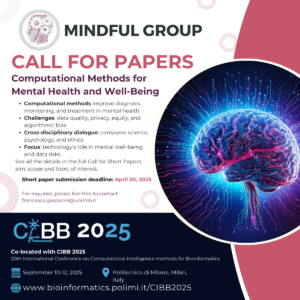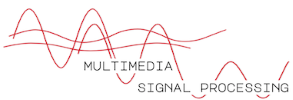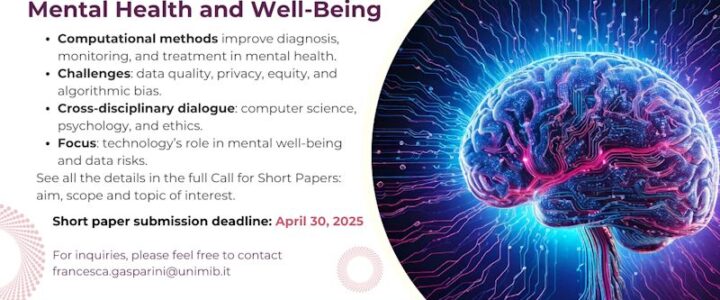Great news!
Prof. Francesca Gasparini is chairing the Special Session on Computation Methods for Mental Health and Well-Being co-located with the 20th International Conference on Computational Intelligence methods for Bioinformatics (CIBB 2025) with Dr. Cristina Crocamo, School of Medicine and Surgery at University of Milano-Bicocca, and Prof. Anna Maria Bianchi, Dept. of Electronics, Information, and Bioengineering at Politecnico di Milano.
Find the call for short papers (4 to 6 pages) in what follows.
Deadline: April 30th, 2025!

*** CALL FOR SHORT PAPERS ***
We are thrilled to announce the opening of the Call for Papers for the first special session on
Computational Methods for Mental Health and Well-Being
co-located with the 20th edition of CIBB, the International Conference of Computational Intelligence methods for Bioinformatics and Biostatistics, which will be held at Politecnico di Milano, Milan, Italy, from September 10th to 12th, 2025.
Conference website: https://www.bioinformatics.polimi.it/CIBB2025
Short paper submission deadline: April 30th, 2025
Aim and scope
The development of computational methods specifically designed for mental health and well-being is critical to address global challenges ensuring an ethical, transformative impact on user outcomes.
These methods have the potential of providing insights into understanding, diagnosing, and monitoring mental health conditions, by delivering personalized and cost-effective solutions to improve health outcomes and quality of care, as well as enabling early intervention, real-time support, and long-term well-being. They can analyze and integrate data from brain activity, behavior, and symptom patterns to explain underlying mechanisms of psychological responses, as well as possible neuropsychiatric pathways and trajectories of care for mental disorders.
However, the adoption of computational models in this specific context opens several challenges that need to be addressed, ranging from the need of high-quality datasets requiring continuous interplay among researchers of different disciplines, to the design of systems that protect user privacy, ensure equity, and prevent algorithmic biases in sensitive mental health applications, to name a few.
The special session on “Computational Methods for Mental Health and Well-Being” aims to provide a cross-disciplinary exchange that combines computer science, psychology, mental healthcare, and ethics. This reflects the growing importance of technology in improving mental well-being, and also stimulates collaborative discussions on integrating computational methods into healthcare systems and identifying gaps in research or applications, while discussing the opportunities and risks presented by the adoption of technologies to manage very sensitive data.
Topics of interest include (but are not limited to):
- Computational models for early detection of mental health issues
- Computational tools for continuous monitoring
- Computational models for personalized interventions
- Computational models for disease risk stratification
- Computational models for multimodal data analysis
- Computational models for emotion recognition
- AI Bias and Fairness in Mental Health and Well-being
SPECIAL SESSION CHAIRS
Francesca Gasparini, Department of Informatics, Systems and Communication, University of Milano-Bicocca, Italy
Cristina Crocamo, School of Medicine and Surgery, University of Milano-Bicocca, Italy
Anna Maria Bianchi, Dipartimento di Elettronica, Informazione e Bioingegneria, Politecnico di Milano, Italy
CONTACTS
For inquiries, please feel free to contact francesca.gasparini@unimib.it
PAPER SUBMISSION AND PUBLICATION
Submission Guidelines
Authors are invited to submit a short paper (4-6 pages) presenting their original research. Paper submissions will be handled through EasyChair platform and detailed instructions on the submission process will be provided later.
Publication Opportunities
Submitted contributions will undergo peer review, and all accepted contributions that will be presented will be also invited for submission of extended versions to the Springer Lecture Notes in Bioinformatics (LNBI) or to a selected journal. We are currently discussing this option with Frontiers and BMC (details forthcoming).
Available templates for submission:

